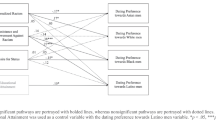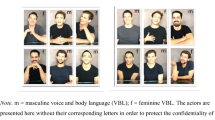Abstract
Empirical studies of attitudes towards, and the sociopsychological characteristics of single women have been neglected by social scientists. As a minority group, subject to normative judgements of their sex-role behavior, single women are vulnerable to prejudicial evaluations by married people of both sexes. The present study investigated aspects of the social environment which have positive or negative consequences for single women. A survey was conducted of N=48 male and female married subjects in an Australian city. Major findings were that (a) married people have little or no contact with single women; (b) males tend to be more negative in their evaluations of single women than females; and (c) most females can allow for the possibility of a major sex role other than that involving marriage.
Similar content being viewed by others
References
Adams, M. The single woman in today's society: A reappraisal. In H. Wortis & C. Rabinowitz (Eds.), The women's movement: Social and psychological perspectives. New York: Wiley, 1972.
Adams, M. Single blessedness. London: Heinemann, 1976.
Australian Bureau of Statistics. Preliminary characteristics. Census of population and housing, 1976.
Bergquist, L. How come a nice girl like you isn't married? In S. Safilios-Rothschild (Ed.), Toward a sociology of women. Lexington, Mass.: Xerox College Publishing, 1972.
Blake, J. Coercive pronatalism and American population policy. International Institute of Internation Studies, University of California. (Undated)
Erikson, E. H. Identity, youth and crisis. London: Faber, 1968.
Firestone, S. The dialectic of sex: The case for feminist revolution. London: Granada Publishing, 1970.
Hacker, H. M. Women as a minority group. Social Forces, 1951, 30, 60–69.
Keller, S. The future role of women. Annals of the American Academy of Political and Social Science, 1973, 408, 1–12.
King, M., & Ziegler, M. Research projects in social psychology. Monterey, Calif.: Brooks/Cole Publishing, 1975.
Mackie, M. Arriving at “truth” by definition: The case of stereotype inaccuracy. Social Problems, 1973, 20, 431–445.
Mercer, J. (Ed.). The other half: Women in Australian society. Ringwood, Victoria: Penguin, 1975.
Parsons, T., & Bales, R. F. Family, socialisation and interaction process. New York: Free Press, 1955.
Stolk, Y., & Brotherton, P. L. The spinster stereotype: A demographic refutation? Melbourne Psychology Reports. Department of Psychology, University of Melbourne, 1979.
Summers, A. Damned whores and God's police: The colonisation of women in Australia. Ringwood, Victoria: Penguin, 1975.
Van Dusen, R. A., & Sheldon, E. B. The changing status of American women: A life cycle perspective. American Psychologist, 1976, 31, 106–116.
Author information
Authors and Affiliations
Rights and permissions
About this article
Cite this article
Stolk, Y., Brotherton, P. Attitudes towards single women. Sex Roles 7, 73–78 (1981). https://doi.org/10.1007/BF00290900
Issue Date:
DOI: https://doi.org/10.1007/BF00290900




